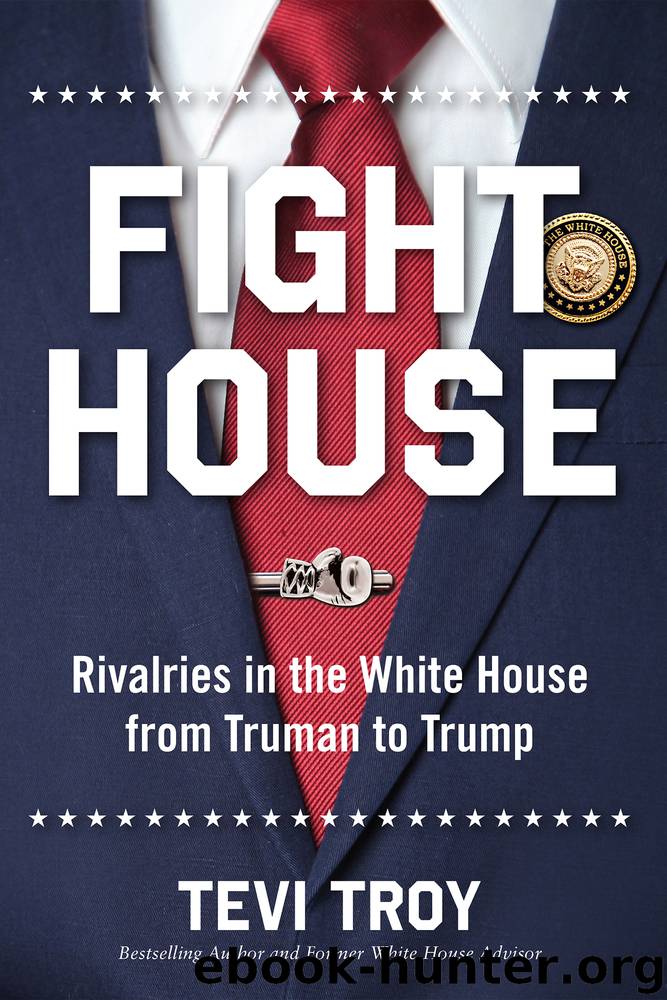Fight House by Tevi Troy

Author:Tevi Troy
Language: eng
Format: epub
Publisher: Regnery History
Published: 2020-02-10T16:00:00+00:00
CHAPTER 8 GEORGE H. W. BUSH
Darman and Sununu versus All
Few presidents can compare to George H. W. Bush when it comes to resume and experience in government. Bush had been a congressman from Texas, director of the CIA, head of the Republican National Committee, chief of the U.S. Liaison Office in the People’s Republic of China, ambassador to the United Nations, and vice president of the United States under Ronald Reagan. Then, in 1988, Bush won the presidency and the opportunity to put this vast array of experience to use in the highest office in the land.
Yet, despite following conservative hero Reagan into the Oval Office, what distinguished Bush was his non-ideological nature. Most agree Bush served in what was effectively Ronald Reagan’s third term, but Bush knew he was different. This fact came as a surprise to many Reaganites when told they would not be keeping their presidentially appointed positions in the new administration. One anonymous Bush transition official explained how this new administration would be different from the earlier one: “Our people don’t have agendas—they have mortgages.” This attitude should not have come as a surprise. Bush had long said he was no conservative ideologue. After he lost the nomination fight against Reagan in 1980, he picked up a copy of William F. Buckley’s conservative National Review and joked, “I guess we can put this away now.”1
With the successful 1988 election behind him, Bush was also no longer a deputy, aide, or appointee: now he was in charge. During the Reagan years, Bush was studiously deferential and distanced; for example, he told Nancy Reagan that weighing in to have Don Regan fired was not his place. Even beyond that issue, he often kept his own counsel when serving as vice president. As Reagan press aide Larry Speakes said of Bush, “Seldom did I hear him speak up, either in Cabinet meetings or in private sessions like our issues luncheons on Monday. Almost never did he weigh in except to say he had heard something from the Texas oilmen or he would say he had just been in Iowa and he had heard such and such.” Direct advice from Vice President Bush was not forthcoming in the Reagan White House. As Speakes noted, “I never heard him say, ‘Mr. President my advice to you would be, this is the wrong thing to do.’ Or, for that matter, ‘This is the right thing to do.’ ”2
Bush’s non-ideological approach led to a vastly different White House staff. Instead of having a troika at the top, Bush merged power in the hands of his chief of staff, former New Hampshire Governor John Sununu. In the Bush administration, the era of presidential schizophrenia on the question of a chief of staff was officially over. Truman had a primus inter pares assistant to the president named John Steelman; Steelman is considered by many the first chief of staff although he did not officially have that label. Eisenhower, with his military background, had started the practice
Download
This site does not store any files on its server. We only index and link to content provided by other sites. Please contact the content providers to delete copyright contents if any and email us, we'll remove relevant links or contents immediately.
| American Revolution | Civil War |
| US Presidents |
Fanny Burney by Claire Harman(26598)
Empire of the Sikhs by Patwant Singh(23079)
Out of India by Michael Foss(16849)
Leonardo da Vinci by Walter Isaacson(13324)
Small Great Things by Jodi Picoult(7126)
The Six Wives Of Henry VIII (WOMEN IN HISTORY) by Fraser Antonia(5509)
The Wind in My Hair by Masih Alinejad(5093)
A Higher Loyalty: Truth, Lies, and Leadership by James Comey(4958)
The Crown by Robert Lacey(4813)
The Lonely City by Olivia Laing(4801)
Millionaire: The Philanderer, Gambler, and Duelist Who Invented Modern Finance by Janet Gleeson(4474)
The Iron Duke by The Iron Duke(4352)
Papillon (English) by Henri Charrière(4265)
Sticky Fingers by Joe Hagan(4193)
Joan of Arc by Mary Gordon(4107)
Alive: The Story of the Andes Survivors by Piers Paul Read(4026)
Stalin by Stephen Kotkin(3963)
Aleister Crowley: The Biography by Tobias Churton(3637)
Ants Among Elephants by Sujatha Gidla(3464)
